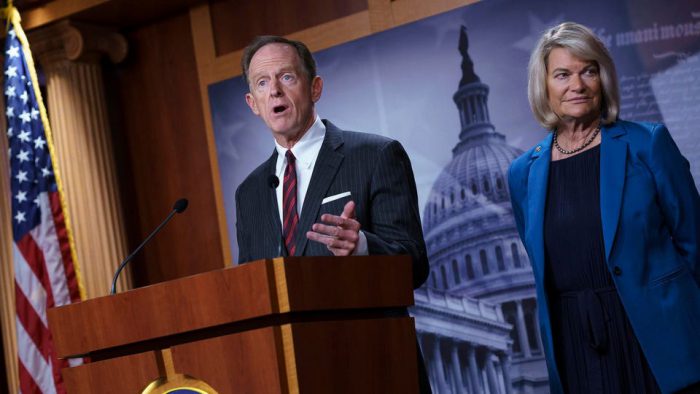Lone Senator Rejects Crypto Provision in Infrastructure Bill
BREAKING: Crucial Crypto Amendment Fails in US Senate. Here’s Who Killed It
A high-stakes cryptocurrency amendment has failed to achieve unanimous consent in the U.S. Senate
After putting forward their dueling amendments to the damaging crypto provision in the infrastructure bill, Senators Rob Portman (R-OH), Cynthia Lummis (R-WY), Patrick Toomey (R-PA), Ron Wyden (D-OR) and Kyrsten Sinema (D-AZ) managed to reach a compromise with yet another rewrite.
The last-minute effort, however, ended up being ultimately futile since Senators Richard Shelby (R-AL) and Bernie Sanders (D-VT) have objected to the amendment due to a dispute over military spending.
Shelby asked for a $50 billion defense amendment to the bill, which didn’t sit well with Sanders.
It was only possible to change the language of the $1 trillion infrastructure bill by unanimous consent since the Senate moved to invoke “cloture” on Monday. This means that the amendment will not make it to the final bill.
Sen. Ted Cruz (R-TX) said that the legislation could obliterate the industry:
There aren’t 5 senators in this body with any real understanding of how cryptocurrency operates.
What’s next?
While the fight in the Senate is already over, the cryptocurrency lobby will now direct its resources to the House of Representatives, according to CoinCenter‘s Jerry Brito:
However, the House is not likely to make any changes in the text of the bill that is expected to be passed on Tuesday morning.
also read :
- Riot Blockchain Inc (RIOT) Up 6.23% in Premarket Trading
- What Is Bitcoin ? The Intelligent Person’s Guide To Bitcoin
- How to get Free Bitcoin ? without Mining or Trading
Lone Senator Rejects Crypto Provision in Infrastructure Bill
The compromise needed unanimous consent – meaning no objections – to pass.
In a blow to the digital assets industry, the U.S. Senate did not adopt a bipartisan compromise on a crypto tax provision in its $1 trillion infrastructure bill after a vote Monday.
U.S. Senators Cynthia Lummis (R-Wyo.) and Pat Toomey (R-Pa.) announced the compromise was supported Democrats, Republicans and the Treasury Department when introducing the amendment earlier in the day, saying it would exempt crypto transaction validators from a broadened definition of “broker.”
U.S. Sen. Richard Shelby (R-Ala.) filed an objection after attempting to attach his own amendment to increase military spending. Sen. Bernie Sanders (D-Vt.) objected to the Shelby motion, resulting in Shelby then objecting to the overall compromise.
The full text of the compromise was not immediately available, but Toomey said it would specify who has tax reporting obligations within the digital asset sector. Software developers, node operators and validators would not be required to carry or report transaction information, but brokers would be.
“We’re not proposing anything sweeping or anything radical – [the compromise] makes clear that a broker means only those persons that conduct transactions where consumers buy, sell and trade digital assets,” Toomey said in a press conference Monday.
The text itself would define a broker as “any person who (for consideration) regularly effectuates transfers of digital assets on behalf of another person,” and would exclude entities that validate transactions (meaning miners or stakers) without providing other services, or entities that sell hardware or software that allow customers to control private keys, according to screenshots shared by Coin Center’s Jerry Brito.
Treasury Secretary Janet Yellen seemed to express support for the compromise in a statement on Monday.
“I am grateful to Senators Warner, Portman, Sinema, Toomey and Lummis for working together on this amendment to provide clarity on important provisions in the bipartisan infrastructure deal that will make meaningful progress on tax evasion in the cryptocurrency market. I am also thankful to Chair Wyden for his leadership and engagement on these important issues,” she said.
However, the compromise came after the Senate conducted a number of procedural votes late Sunday to advance the bill’s original text. The legislative body will send the original provision to the House of Representatives.
The bill, which has been held up repeatedly for a number of issues including the crypto provision, seeks to fund $1 trillion in both infrastructure maintenance and new initiatives like electric vehicle charging stations. Part of the bill expects to pay for these initiatives through $28 billion raised over the next 10 years through expanded crypto tax reporting requirements.
The crypto industry pushed back against the wording of this provision amid concerns that the revised definition of a “broker” would capture miners or other types of validators, hardware manufacturers, software developers and other network participants that don’t have customers or otherwise any ability to comply with the information reporting rules.
Senators Ron Wyden (D-Ore.), Lummis and Toomey introduced an amendment to exempt non-broker type entities from the legislation. Earlier on Monday, Wyden said, “I don’t believe the cryptocurrency amendment language on offer is good enough to protect privacy and security, but it’s certainly better than the underlying bill. Majority Leader [Charles] Schumer says he won’t block a unanimous consent request on it.”
Senators Ron Portman (R-Ohio), Mark Warner (D-Va.) and Kyrsten Sinema (D-Ariz.) also introduced an amendment, which would only exempt validators from proof-of-work or proof-of-stake networks. The White House previously announced its support for this amendment.
All six senators support the new compromise, Toomey said.
Crypto isn’t the only issue that held up passage of the overall infrastructure package. Rather, it has been one of a handful.
It was non-crypto issues that held up debate and votes on Sunday, according to multiple reporters in Washington, D.C.
Senate Rejects Change To New Crypto Tax Rules In $1.2 Trillion Infrastructure Bill Despite Lawmaker, Billionaire Pushback

TOPLINE Following days of negotiations, the Senate on Monday struck down a bipartisan amendment to overhaul and clarify newly proposed cryptocurrency tax-reporting requirements included in the Senate’s $1.2 trillion infrastructure bill, dealing a potentially massive blow to a slew of companies concerned they could be forced to hand over user-transaction information to the Internal Revenue Service.
In a Monday afternoon session, the Senate rejected a last-minute amendment to specify that new regulation forcing businesses to report cryptocurrency transactions in excess of $10,000 to the IRS should only affect traditional brokers, or “businesses who conduct transactions on exchanges where consumers buy, sell and trade digit assets.”
Sen. Richard Shelby (R-Ala.) struck down the amendment by objecting to a request for unanimous consent, which would have only adopted the measure if no senator objected to the proposal.
Shelby signaled he would only reserve his objection if senators wrapped in his unrelated amendment to boost military spending by about $50 billion, but Sen. Bernie Sanders (I-Vt.) struck down Shelby’s proposal, citing climate change concerns fueled by the defense industry.
A group of five senators, led by Pat Toomey (R-Pa.) and Cynthia Lummis (R-Wyo.), introduced the cryptocurrency amendment early Monday to clarify language in the infrastructure bill targeting any party facilitating cryptocurrency transactions on behalf of another person—a provision many experts and lawmakers criticized as “overly broad” last week.
The unamended provision “sweeps in non-financial intermediaries like miners, network validators, and other service providers,” Toomey said in a statement, arguing such parties “never take control of a consumer’s assets” and don’t have the required user information needed to report income to the IRS.
The prevailing language has also fueled concerns that officials may use the regulation to clamp down on non-broker parties in measures that could ultimately dissuade intermediaries like cryptocurrency miners from setting up business in the United States.
CRUCIAL QUOTE
“Developers are the lifeblood of innovation, and subjecting them to tax reporting would have far-reaching implications on privacy, and on the evolution of technology in this country—not to mention, most developers would not have access to useful data [for the IRS],” Lummis said on the Senate floor Monday. “This amendment has started the debate on many difficult questions related to financial technology that the Senate must address over the next few years.”
BIG NUMBER
$28 billion. That’s how much Congress’ Joint Committee on Taxation estimates the enhanced reporting requirements proposal would generate in fiscal revenue over the next decade by giving taxpayers and the IRS more visibility into taxes owed from crypto transactions.
KEY BACKGROUND
Tucked deep into the Senate’s 2,702-page infrastructure proposal released last week, the proposed cryptocurrency regulation quickly caught the eye of industry experts. “This should have been required a long time ago,” Eric Pierre, a Texas-based certified public accountant and owner of Pierre Accounting, told CNBC Tuesday, adding that targeted requirements could ease the complicated—and at times unclear—reporting process for cryptocurrency transactions. “There’s no real reporting or tracking mechanism, and it’s up to [tax professionals] to do a lot of subjective analysis,” he said. And while many came out against the unamended proposal for language they claimed was too broad and too vague in defining brokers, others also welcomed the regulation as a watershed moment for cryptocurrency adoption. “As Wall Street gets more comfortable with the regulatory framework governing bitcoin and crypto assets in general, institutional adoption of BTC is going to accelerate,” billionaire Michael Saylor, who heads up MicroStrategy, which owns more bitcoin than any other corporation, tweeted last week.
TANGENT
Echoing concerns from others in the industry, billionaire Coinbase CEO Brian Armstrong called the reporting requirements a “great idea” for financial services firms but warned the provision could have a “profound negative impact on crypto in the U.S.” and unintentionally push cryptocurrency companies offshore.












